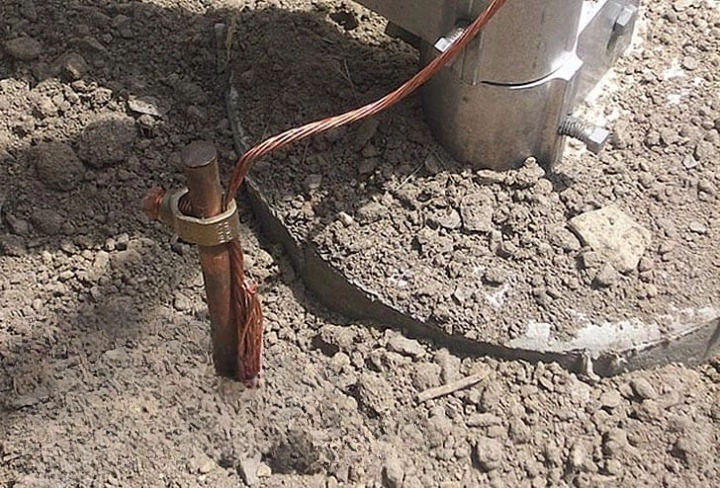
Nuclear energy plays a role in South America’s energy sector as compared to other regions. Some of the countries have explored nuclear power as an option, influenced by several factors. Some of the nuclear power plants in the region include the Embalse nuclear power plant in Argentina and the Angra nuclear power plant in Brazil. The nuclear reactors in Argentina collectively generate around 10% of the country’s electricity. Nuclear energy has the potential to enhance energy security, diversify energy sources, and reduce greenhouse gas emissions. Adoption of this energy could provide the opportunity to decarbonize the energy systems. This is because nuclear energy is a low-carbon energy source that can help reduce reliance on fossil fuels. This could help the continent meet its climate change goals under the Paris Agreement. Further, grounding systems provide a path for faulty currents. They also protect the equipment and personnel by preventing electric shock.
Grounding wires run along the transmission towers and electrical equipment to provide a safe path for fault currents. Ground rods drive into the earth near transmission towers and substations. This is to ensure proper dissipation of electrical faults. By doing so, grounding systems play a vital role in ensuring the reliability and safety of nuclear power plants in South America. The reliability of nuclear energy depends on factors such as grid stability, base load power, and operational efficiency. Discover how nuclear energy solves the problems of electricity and the role of grounding systems in South America’s energy sector.
Role of nuclear energy in addressing electricity problems in South America
Nuclear energy provides solutions to electricity problems in South America. This is by ensuring energy security and grid reliability issues. Additionally, nuclear energy supports climate goals and reduces dependency on fossil fuels. By doing so, it provides benefits that help overcome challenges in the region’s energy sector. This makes nuclear energy a vital component of South America’s energy future. Grounding systems in nuclear power plants ensure safety, protect the equipment, and provide a reliable electrical supply. The following are the ways nuclear energy helps solve electricity problems in South America.

- Energy security and independence – nuclear energy reduces the dependence on fossil fuel imports. For instance, Argentina and Brazil can reduce their reliance on imported fuels and increase energy independence.
- Low carbon emissions – South America has set ambitious climate goals aiming to reduce the carbon footprints. Nuclear energy produces no greenhouse emissions during operation, which makes it critical in fighting climate change. It also complements renewable energy by providing a steady source of electricity during low solar and wind energy production.
- Diversification of energy mix – South American countries are dependent on hydroelectric energy, which is susceptible to droughts and seasonal variations. Nuclear energy provides a stable and predictable source of electricity. This helps these countries spread risk across different energy sources and reduce reliance on a single source.
- Technological innovation – investments in nuclear technologies provide flexibility, safety improvements, and the potential for greater scalability. In Argentina, there is the development of small modular reactors that are economically viable than traditional large-scale reactors. These modern technologies have improved safety features that reduce the risk of accidents.
Environmental impacts of nuclear power plants and the role of grounding systems
Nuclear power plants have both positive and negative impacts depending on how they are managed. Nuclear energy, as already mentioned, helps reduce carbon emissions and provide reliable energy. The nuclear power plants, however, pose challenges like radioactive waste, thermal pollution, and the risk of accidents. Grounding systems in nuclear power plants help mitigate the risks related to electrical faults. Common environmental impacts include nuclear waste, thermal pollution, water use, radioactive contamination risks, and land use and habitat disruption. At TTF Power Systems, we are a one-stop shop for utility pole hardware fittings, transmission line accessories, and power line construction equipment, offering our customers the industry’s widest selection of products, exceptional value, and professional service. The following are the roles of grounding systems in mitigating environmental and safety risks.

- Preventing electrical faults and equipment damage – the systems safely dissipate excess electrical energy into the ground. This helps to prevent electrical fires, malfunctions, or power outages.
- Preventing environmental contamination – grounding systems help prevent electrical accidents that could lead to equipment failure. Overheating of the reactor core could lead to radioactive leaks into the environment.
- Protecting human and animal health – a properly designed grounding system reduces the risk of electrical accidents. They ensure the stray currents do not create dangerous conditions that could lead to plant malfunctions.